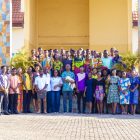Ascend Digital Solutions Ltd. hosted its inaugural webinar on May 25, 2023, delving into the transformative power of digital innovation in driving forward the African Union’s Agenda 2063. This virtual event, which was broadcast to a wide audience via YouTube and LinkedIn, brought together passionate participants from across Africa and beyond who are dedicated to propelling the continent’s growth through digital advancements.
The distinguished panel of speakers featured industry leaders, including Lacina Koné (Director General/CEO, Smart Africa), Harkirit Singh (CEO, Ascend Digital Solutions Ltd.), Prince Ofosu Sefah (Administrator/CEO, GIFEC Ghana), and Seyni Malan FATI (Senior Policy Manager – Sub-Saharan Africa, GSMA). With their expertise spanning policy, regulatory, investment, telecommunications and digital transformation in Africa, these thought leaders engaged in a captivating conversation centered on “the role of digital transformation in achieving the AU Agenda 2063”.
At the core of the AU Agenda 2063 lies a strategic framework designed to unleash Africa’s socio-economic transformation, fostering an integrated, prosperous, and peaceful continent. By addressing key challenges such as economic development, social inclusion, infrastructure, regional integration, and good governance, this visionary blueprint aims to position Africa as a united, self-reliant, and globally competitive entity and transform the continent into an e-society.
Within this context, digital transformation emerges as a pivotal catalyst for realizing the agenda’s ambitious vision. The webinar underscored the profound shift in perception regarding connectivity, as Lacina Koné highlighted the COVID-19 pandemic’s impact, noting that connectivity has transformed from a luxury to an essential element in our everyday life, akin to water, electricity, and healthcare. It has therefore became apparent that digital transformation cannot be the sole mission of a single institution; it necessitates intentional private-public partnerships to bridge the connectivity usage gap. By leveraging collaborative expertise, resources, and infrastructure, these partnerships ensure equitable and affordable connectivity, leaving no one behind in the digital age.
Seyni Malan FATI highlighted the need for governments and regulatory bodies to establish policies and frameworks that foster competition, innovation, and investment in digital infrastructure, laying the foundation for an enabling ecosystem. Through resource sharing, mutual support, and a unified approach, countries can collectively address common challenges, promoting an inclusive digital ecosystem across the continent.
As the webinar progressed, it became evident that Africa’s digital transformation required a mindset shift among its leaders. Harkirit Singh , therefore, stressed the need for constant connectivity, encouraging leaders to embrace a digital mindset that fosters collaboration and shared infrastructure. Prince Ofosu Sefah added to this by emphasizing the significance of digital sovereignty, urging Africa to shift from being mere consumers of technology to becoming creators and innovators. This shift ensures Africa retains control over its data, enabling it to drive its own digital transformation.
Digital transformation transcends national boundaries, presenting both challenges and opportunities. To unlock Africa’s digital potential and realize the goals of the AU Agenda 2063, cross-border cooperation, capacity building, knowledge sharing, conducive policy frameworks, and private-public partnerships stand as crucial pillars. These collaborative efforts will propel Africa towards inclusive economic development and a digitally transformed future.
If you missed the webinar, you can watch the recording either on YouTube or LinkedIn.





